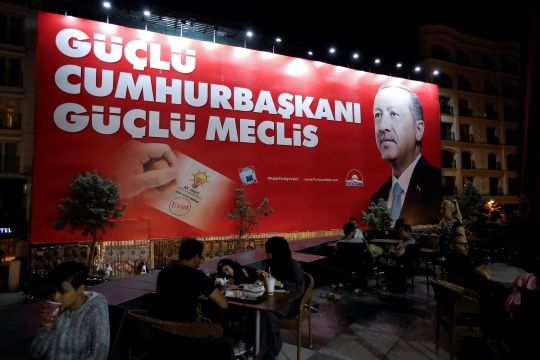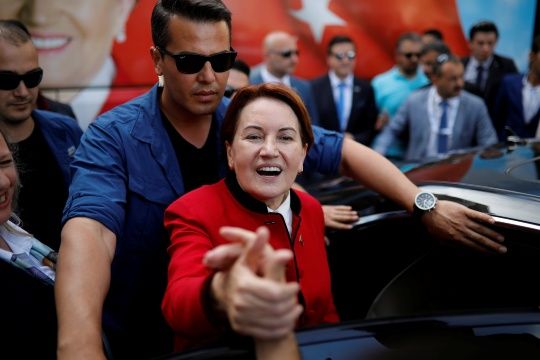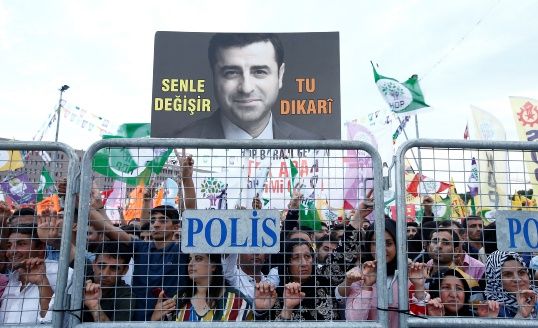Turkey's general elections will take place Sunday June 24, after current President Recep Tayyip Erdogan decided to push them forward more than a year, prompting five candidates to try to oust Turkey's most popular politician Erdogan.
RELATED:
The people will elect the new president of the republic in a two round system. If none of the candidates gets 50 percent plus one of the votes, a second round will be held on July 8.
Also, there are two major alliances that will compete in the parliamentary race: the People's Alliance, composed by Erdogan's ruling Justice and Development Party (AKP) and its ally the Nationalist Movement Party (MHP); and the opposition Nation Alliance, composed of a wide range of opposition parties including the secular Republican People's Party (CHP) and the Good Party (IYI).
The People's Democratic Party (HDP), often described as a left-wing and pro-minorities party, will run by itself in the parliamentary and presidential elections but its leaders has vowed to support any candidate that would faceoff Erdogan in a second round.
The current president is also the front-runner for the elections with 48.7 percent of the vote intention, according to the polling firm Gezici. However, his massive support is not enough to give him victory in the first round, and could lose the second one if the opposition parties support a single candidate to oust him.
Erdoğan started his political career in the National Salvation Party in the early 1970s, which he joined through the National Turkish Student Union, a conservative student organization founded during the Cold War.

He became mayor of Istanbul in 1994 by the Welfare Party but was forced out of office when sentenced to 10 months in prison in 1998 for reciting a poem loosely based on lines by the nationalist Ziya Gokalp, one of Turkey’s ideological founding fathers, which was interpreted as an Islamist turn by the military and guardians of secularism:
“The mosques are our barracks,
the domes our helmets,
the minarets our bayonets,
and the believers our soldiers.”
His imprisonment led to widespread protests in his support, due to his popularity as mayor, which encouraged him to form his own political organization in 2001, the AKP.
He first came into power as prime minister in 2003. He remained in office until 2014, when he became president. He has since then began a process to change the political structure of Turkey into an executive presidency.
The massive Gezi park protests, one of the biggest in Turkey’s recent history, happened in 2013 during his administration, which earned him great discontent among the secular, leftist and liberal sectors of society. However, his economic developments (Turkey’s economy grew more than 5 percent a year during most of his administration) and increasing regional leadership have proved enough to keep him with a high approval rating and support from a great part of Turkish society.
Between his time in prison and the first years of his administration, Erdoğan was very careful with his remarks and even defended the separation of religion and the state, but in recent years he began more vocal about his religious roots, prompting opposition sectors to accuse him of trying to reverse the secular constitutional legacy of the republic's founder Mustafa Kemal Ataturk.
In a country with a dark history of military coup, Erdogan managed to survive the one and only failed coup against him in 2016 when his supporters responded to his calls and took to the streets against the dissident soldiers and managed to defeat the military takeover. The country has since been under a state of emergency giving Erdogan extra powers which he and his party say are needed to deal with internal and external threats of terrorism.
RELATED:
In recent years his government has significantly gotten involved in the Syrian war where Turkish forces entered Afrin in northern Syria and have been involved in military operations along some local rebels fighting Islamic State group and pushing back against Kurdish forces taking over territory on the border with Turkey. Turkey views Kurdish rebels in Syria as well as in Kurdish regions in southeast Turkey as terrorists due to their decades-long struggle for independence and most recently political and regional autonomy.
Erdogan has also been one of the most Muslim leaders in the region due to his support for the Palestinian people and leading an international diplomatic resistance against the state of Israel, which is welcomed by many pro-Palestinian groups and factions across the political spectrum.
He is backed by the People's Alliance (Cumhur İttifakı), led by his own AKP and the Nationalist Movement Party (MHP). With almost 50 percent of the vote intention in most polls, he might not even need a second round of elections with a little bit of luck.
Muharrem İnce
The ex-high school physics teacher is considered to be the candidate with best chances of beating Erdoğan. He is a leading figure in the opposition secular Republican People's Party (CHP) and has served as its parliamentary group deputy chairman twice.
He graduated from the physics-chemistry department and was president of the Ataturkist Thought Association, promoting the ideas of the secular founding father of the Republic of Turkey, Ataturk.
Before a rather unknown character in the political sphere, his opposition to Erdoğan and his heated speeches has earned him popularity among those that want the current president away from office for the next few years, including secular, conservative and right-wing voters.
“I will be the president of everyone, Turkey’s 80 million citizens, of members of the [ruling] Justice and Development Party, the Nationalist Movement Party, the Peoples’ Democratic Party, the Felicity Party, leftists, rightists, Alevis, Sunnis, Turks and Kurds,” he said in his first, passionate speech after being nominated as his party's presidential candidate.
Teşekkürler Çorlu pic.twitter.com/XaDm17VdXt
— Muharrem İNCE (@vekilince) 20 de junio de 2018
“Thanks, Çorlu,” tweeted İnce after a campaign event in northwestern city.
His campaign slogan is: “Türkiye’ye güvence Muharrem İnce,” roughly translating as "Muharrem İnce, security for Turkey."
Meral Akşener
Meral Akşener founded the IYI Party in 2017 after breaking away from the MHP over its unconditional support for Erdoğan and his plan to reform the constitution.
She started her political career with the extinct True Path Party (DYP, Doğru Yol Partisi) and served as Minister of Interior before being ousted by the “1997 military memorandum,” also called the “Postmodern coup" which saw the military ordering the government to resign and call for reelection instead of facing a full-on military takeover.

Among her proposals are writing a new constitution to replace that of Erdoğan and returning to a parliamentary system, trying to back track on the current's president aim to concentrate functions in the executive power, ending the ban on Wikipedia, protect Kemalist principles and implement European Union standards on press freedom.
She considers European Union membership as a long term goal, which at some point was one of the important objectives of Erdogan's AKP party.
She earned a Phd. in history and is called Asena by her supporters, in reference to the mythical she-wolf that gave birth to the Gokturk and other Turkic clans, symbols for Turkish nationalism.
Her campaign slogan is “Yüzünü güneşe dön Türkiye!” which loosely translates as “Turn your face to the sun, Turkey!”
The pollster Gezici gives her 14.4 percent of the vote intention, but others give her up to 30 percent and place her at second place.
Demirtaş, who is running for the presidency from prison, is the candidate of the People’s Democratic Party (HDP), a left-wing party that embraces feminist, participatory democracy and ecologist ideologies, and defends the rights of minorities such as Kurdish and LGBT commuinites. Polls place him in third place.
He was arrested in 2016 along with Figen Yuksekdag, the other co-leader of the HDP, for allegedly supporting the outlawed Kurdistan Workers’ Party, PKK, allegations he denies.

He is Kurdish Zaza descent and started his political career as a member of the parliament of the Democratic Society Party and became co-chair of the HDP, the successor of that party, in 2014. He is mostly popular in southeastern Turkey, where there’s a greater Kurdish population which amounts to more than 20 million people of Turkey's 90 million.
Prosecutors opened 102 investigations and filed 34 cases against him, which could sentence him up to 183 years in prison.
RELATED:
In an opinion piece published on Wednesday, Demirtaş describes himself as a “political hostage.”
“Only the democratic struggle of the people for their own freedom will free Turkey from authoritarianism and fear and free its institutions — the judiciary and the press — from tutelary control by the government,” Demirtaş wrote.
Karamollaoğlu and Perinçek have a small fraction of the vote intention, and they are considered to be the weakest candidates in the elections.
Karamollaoğlu is the leader of the Felicity Party (Saadet Partisi), an Islamist political organization supported by a great part of the conservative sector of society. It was formed after the Islamist Virtue Party was constitutionally banned in 2001 and the more reformist side founded the AKP.
Despite having the same mentor as Erdoğan, former ousted Prime Minister Necmettin Erbakan, Karamollaoğlu distances himself from the president and criticizes his economic, domestic and foreign policies, which he describes as “chaotic.”
“The policies imposed by Erdoğan or his government are not helping Turkey to maintain a strong position in virtually any aspect,” Karamollaoğlu told The Guardian. “His strategies and discourses create polarization in Turkey. In great part he's irrespectful of defense of law,” he added.
Bugün Konya'da aziz milletimiz ile bir araya geldik. Bu muazzam mitingimize katılan ve emeği geçen herkese teşekkür ederim.#TemelBaşkanKonyada pic.twitter.com/GD19ZA1h5o
— Temel Karamollaoğlu (@T_Karamollaoglu) 21 de junio de 2018
"Today we met with our dear nation in Konya. I would like to thank everyone who joined and participated in this marvelous meeting."
His candidacy, along with Akşener's, are trying to challenge Erdoğan's intentions to present himself as the candidate of Turkish Islam. Even Though Karamollaoğlu has Islamist tendencies, he defends the separation of state and religion, a line the current president has been accused of blurring.
Perinçek, on the other side, is the candidate for the leftist Patriotic Party (VP), the successor of the socialist and workers' party.
In 1996, he was arrested and imprisoned for criticizing government joint operations with criminal gangs to fight Kurdish guerrillas in southeastern Turkey, but was released shortly after. He was also arrested as part of the crackdown on the “Ergenekon case,” an alleged coup conspiracy, and released a year later.
He was convicted by a Swiss court for denying the Armenian genocide, but was absolved after appeals.
Even though parties are running separately in the presidential race, some of the biggest ones are uniting forces against Erdoğan's political coalition in the parliamentary elections and polls and analysts give them a big chance of securing a majority.
The ruling AKP joined with the (MHP) in the “People's Alliance” (Cumhu İttifakı) for both the parliamentary and the presidential elections. Other minor parties, such as the Great Unity Party (BBP), the Motherland Party (ANAP) and the pro-military AS Party joined the coalition for the parliament. The pan-Islamist HUDAPAR joined the alliance only for the presidential race and will stand alone for the parliamentary one.
And challenging the ruling party and its allies is the Nation Alliance (Millet İttifakı), composed by the main opposition parties including Ataturk's CHP, the IYI Party, the Felicity Party and the Democrat Party. It's also supported by the Democratic Left Party, the True Path Party and the Homeland Party.
Given the eclectic nature of the alliance, with the opposition against the ruling Erdogan government being the only common ground for their alliance, the election could end up in a fragmented parliament.